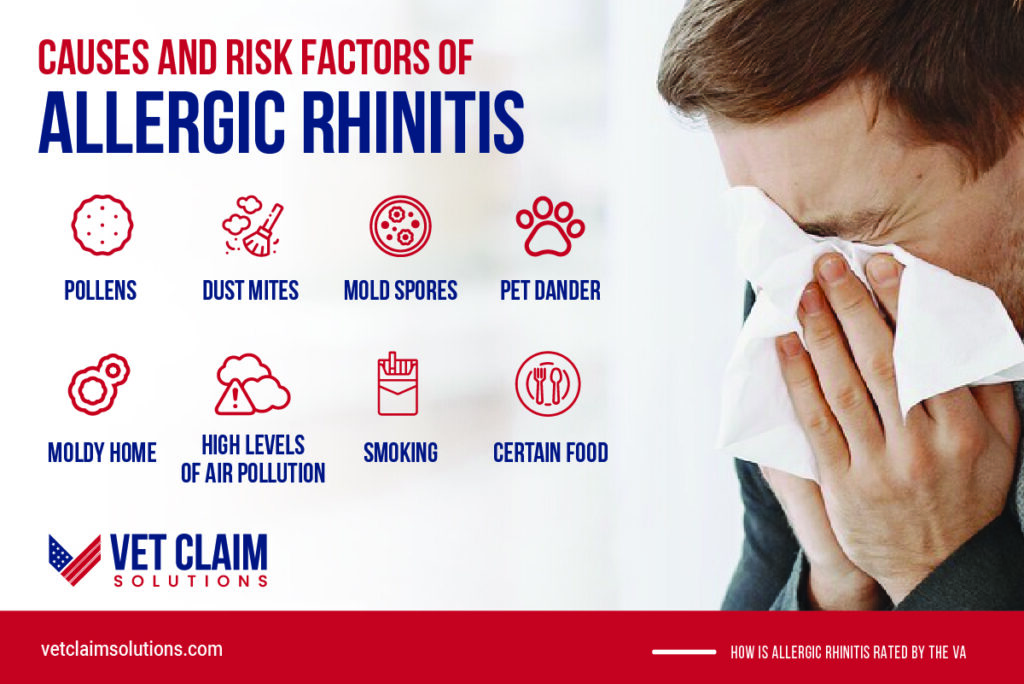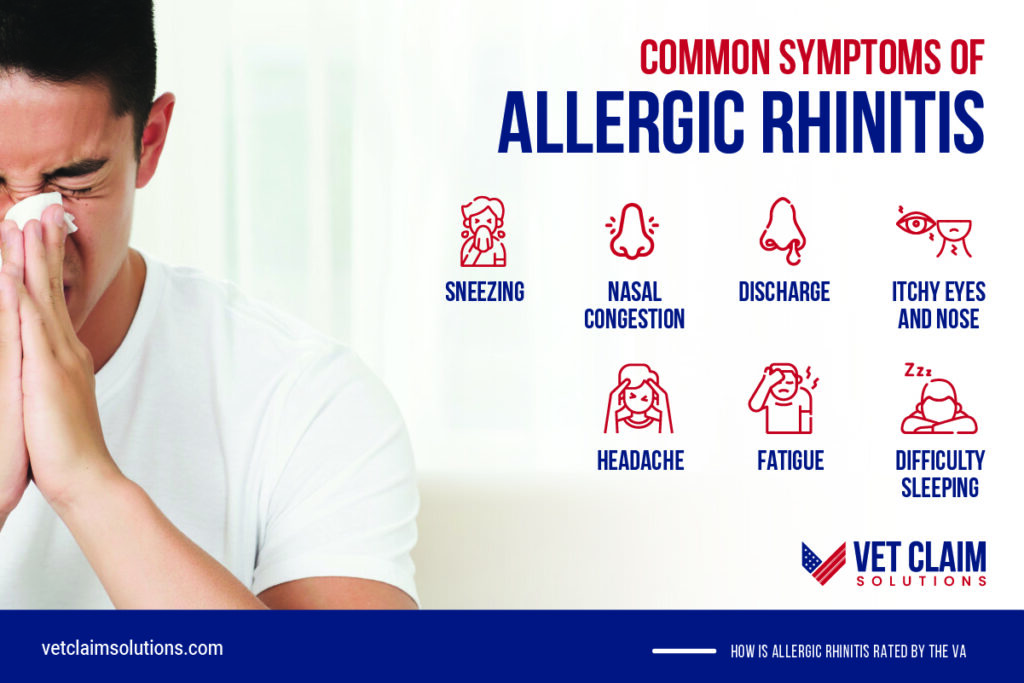The effects of allergies can range from inconvenient to debilitating, and the condition can make life incredibly challenging for those affected by allergic Rhinitis. It’s important to understand how the VA rates this condition to determine your eligibility for a disability rating. In this blog post, we’ll explore what Allergic Rhinitis is and how the VA rates it in order to determine the amount of disability compensation you may be eligible for. Read on to learn more.
What is Allergic Rhinitis?
Allergic Rhinitis is an inflammatory condition of the nasal airways caused by an allergic reaction to a particular allergen. Allergic Rhinitis affects millions of people in the United States and is typically triggered by airborne allergens such as pollens, dust mites, mold spores, pet dander, and certain foods. It can cause several symptoms, including sneezing, nasal congestion, discharge, itchy eyes and nose, headache, fatigue, and difficulty sleeping.
Causes and Risk Factors for Allergic Rhinitis

An allergic reaction to a particular allergen causes Allergic Rhinitis. Common allergens that cause Allergic Rhinitis include pollens, dust mites, mold spores, pet dander, and certain foods. People with allergies are more likely to develop allergic Rhinitis than people without allergies. Certain environmental factors can increase the risk of developing allergic Rhinitis, including high levels of air pollution, living in a damp or moldy home, and smoking.
Common Triggers of Rhinitis Symptoms

Common triggers of rhinitis symptoms include exposure to airborne allergens such as pollens, dust mites, mold spores, pet dander, and certain foods. Other triggers can include changes in the weather or temperature, exposure to smoke or fumes, strong odors or perfumes, exercise, and stress. It is important to identify your own triggers in order to avoid exposure as much as possible.
Types of Allergic Rhinitis
Allergic Rhinitis can be classified into two types:

Seasonal Allergic Rhinitis
Seasonal allergic Rhinitis and perennial allergic Rhinitis. Seasonal Allergic Rhinitis occurs seasonally or during certain times of the year and is typically caused by pollens from trees, grasses, and weeds.

Perennial Allergic Rhinitis
Perennial Allergic Rhinitis occurs throughout the year and is typically caused by indoor allergens such as dust mites, mold spores, and pet dander.
How VA Rates Allergic Rhinitis
VA assigns Allergic Rhinitis ratings under Diagnostic Code (DC) 6522 of the 38 CFR § 4.97 – Schedule of Ratings, Respiratory System. Veterans may qualify for 10 or 30 percent ratings depending on severity and symptoms.

To receive a 30 percent evaluation, the veteran must have polyps in their nose.

10 percent ratings are assigned to veterans without polyps but with more than 50 percent obstruction of the nasal passage on both sides, or complete obstruction on one side.
Extraschedular Rating
If an individual feels that their allergic Rhinitis symptoms don’t fit the criteria mentioned above, they may be eligible for an extraschedular VA disability rating. An extraschedular rating may be granted for veterans whose symptoms are particularly unique or severe and not considered in DC 6522. To qualify for an extraschedular rating, veterans must meet the criteria outlined in VA regulation 38 CFR § 3.321(b)(1).
Establishing a Service Connection for Allergic Rhinitis
Establishing a service connection for Allergic Rhinitis requires more than just a diagnosis. You must be able to provide evidence that your condition is related to military service and you must have proof of an in-service incident or event that caused or aggravated the condition. The evidence must link the in-service incident or event and your current diagnosis of Allergic Rhinitis.
In addition, you need a medical nexus that connects the two elements, typically provided by a VA doctor who evaluates the evidence and decides whether there is sufficient evidence to conclude that the service caused or aggravated your condition. You may also need to provide medical records, service medical records, and other relevant documentation to support your claim for a service connection for allergic Rhinitis.
Secondary Service Connection for Allergic Rhinitis

Allergic Rhinitis may arise as a secondary service connection if it is linked to another illness or disability that was caused by military service. This could be an injury sustained during service that leads to a deviated septum, which can in turn worsen Allergic Rhinitis and sinusitis.
To be eligible for secondary service connection, an individual must prove that there is a primary medical condition that is directly related to military service and then show evidence of how the secondary condition developed as a result of treatment or symptoms associated with the primary medical condition.
For example, if an individual has already been diagnosed with Allergic Rhinitis and their symptoms worsen after military service, this could be a possible case of secondary service connection by aggravation.
However, if an individual has never been diagnosed with Allergic Rhinitis before military service, then this would not qualify as a secondary service connection and a direct service connection should be pursued. It is important to note that all medical evidence should be provided in order to prove the existence of a secondary service connection for Allergic Rhinitis. If the necessary criteria are met, then the individual may be eligible to receive benefits associated with their secondary service connection.
Service Connection by Aggravation
In addition to service connection by aggravation, veterans may also be eligible for disability compensation if a preexisting condition is aggravated during military service. Even if a veteran had allergies prior to joining the military, an aggravation of their condition caused by exposure to allergens in the service could qualify them for disability compensation.
For example, if a veteran had mild Rhinitis before service and is exposed to allergens while serving in the military, chronic Allergic Rhinitis may develop as a result of this exposure. This could be eligible for disability compensation as an aggravation of the preexisting condition.
Furthermore, aggravated conditions such as sinusitis could still be eligible for service connection, even if the initial condition was not directly caused by service. This can give veterans more options when seeking disability compensation.
The VA may determine that a veteran’s condition is aggravated in two ways; either through direct causation or secondary causation.
Direct causation means that the aggravation of the condition was caused directly by military service. Secondary causation means that the aggravation of the condition was caused indirectly as a result of service and not necessarily due to direct exposure or trauma. In either case, veterans should be aware that they may still be eligible for disability compensation if their preexisting condition is aggravated during military service.
Compensation & Pension Exams for Allergic Rhinitis
Veterans making a claim for Allergic Rhinitis will need to undergo a C&P exam. This examination is not used to treat the illness, but rather to collect information on the severity of the illness which will be forwarded to the VA and used as part of their determination of benefits eligibility.
The doctor conducting the exam may review your claim, ask you questions from the Disability Benefits Questionnaire, and carry out a physical exam or order tests such as X-rays to gain a better idea of the illness’s severity.
If the examination proves unfavorable, then your claim may not be approved. In this case, it is possible to appeal the decision. To increase your chance of success during this stage, it is recommended to send copies of relevant medical paperwork and records to the doctor’s office in advance, arrive on time for the examination and be honest about the symptoms you are experiencing. If there is more than one disability causing unemployability, then multiple claim exams may be required.
Need Help filling Allergic Rhinitis?
If you need help filing a claim for Allergic Rhinitis, Vet Claim Solutions can provide assistance. With our team of experienced professionals, we have the expertise to guide you through the entire claims process and ensure your claim is successful. We understand how confusing the VA claims process can be and are here to help make it easier for veterans to get the benefits they deserve. Contact us today to get started, and let us help you get the benefits you are entitled to.
Conclusion
Allergic Rhinitis can be a serious condition that can interfere with a veteran’s ability to work. Veterans who have been diagnosed with this condition due to their service may be eligible for VA disability benefits. To increase the chances of success when filing a claim, it is important to provide all necessary medical records and documents as part of the claim process. With the help of Vet Claim Solutions, veterans can get the assistance they need to ensure their claim is successful and they receive the benefits they deserve.
FAQ:
1. How do I file a VA disability claim for Allergic Rhinitis?
To file a VA disability claim for Allergic Rhinitis, you must submit the necessary paperwork and documents to the Department of Veterans Affairs (VA). This includes any medical records that show your diagnosis and how severe your condition is. You may also need to undergo a Compensation & Pension (C&P) exam. This exam is used to collect information on the severity of your condition which will be forwarded to the VA and used as part of their determination of benefits eligibility.
2. Is Allergic Rhinitis a service-connected disability?
Yes, in some cases, Allergic Rhinitis can be a service-connected disability. If you were diagnosed with the condition during or as a result of your military service, then you may be eligible for VA disability benefits. To receive these benefits, you must provide sufficient evidence to prove that your condition is related to your service. This can include medical records, witness statements, and other documentation.
3. Am I eligible for VA disability compensation if I have been diagnosed Allergic Rhinitis?
Yes, you may be eligible for VA disability benefits if you have been diagnosed with Allergic Rhinitis due to your service. You should submit all necessary documents and records as part of the claim process in order to increase your chances of a successful claim.
4. What is the VA rating for Allergic Rhinitis?
The VA rating for Allergic Rhinitis depends on the severity of the condition, as assessed by a medical professional during a C&P exam. Ratings between 10% and 30% may be assigned depending on the impact of your symptoms and how it affects your ability to work.


